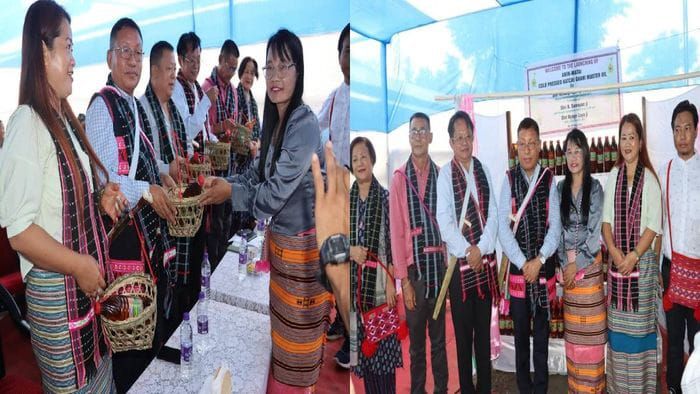
TEZU — In a significant step towards fostering health-conscious consumption, sustainable agriculture, and rural entrepreneurship, Lohit district on Friday inaugurated a state-of-the-art cold-pressed mustard oil extraction unit.
Deputy Commissioner K.N. Damo, who inaugurated the facility, stressed the importance of strict quality control and consistency, stating that “trust is the foundation of any successful brand.” He encouraged the proprietor to expand operations into other cold-pressed oils such as groundnut and sesame, thereby widening market potential and strengthening the region’s agribusiness ecosystem.
Underscoring the need for indigenous production, Damo assured full support from the district administration for marketing and promotion. Plans include showcasing the oil at local events, using it in official souvenirs, and running public awareness campaigns. He also urged farmers to move away from opium cultivation, warning of its long-term harmful effects, and instead focus on sustainable, health-oriented crops that benefit both incomes and social well-being.
Proprietor Bachamso Chiba expressed gratitude to the District Agriculture Department, particularly N. Somnyan, now Joint Director of Agriculture, for his guidance in establishing the enterprise. He highlighted the dual objective of promoting healthier oil consumption and generating local employment while reducing dependence on imported edible oils.
Joint Director N. Somnyan traced the evolution of mustard oil production in the region—from traditional wooden ghanis to advanced mechanised systems—and emphasised the nutritional superiority of cold-pressed oils. Despite their higher cost, he said, they retain essential antioxidants, vitamins, and natural compounds that enhance health benefits.
District Agriculture Officer Nyage Loya highlighted Lohit’s fertile lands and advocated diversification into oilseeds such as sesame, groundnut, and oil palm. He assured farmers of technical support and subsidies under the National Mission on Edible Oils (NMEO), adding that oil palm cultivation, contrary to concerns, does not degrade soil quality.
The event saw participation from ZPM Sunpura, Mrs. Angenlu Minin Chaitom, the District Horticulture Officer, CALSOM representatives, and several local farmers and entrepreneurs.
The inauguration marked not only the launch of a new business but also a larger vision for building self-reliant rural economies, promoting healthier diets, and ensuring environmentally sustainable livelihoods across Arunachal Pradesh.
